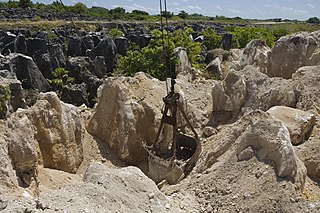Related Research Articles

The economy of Nauru is tiny, based on a population in 2019 of only 11,550 people. The economy has historically been based on phosphate mining. With primary phosphate reserves exhausted by the end of the 2010s, Nauru has sought to diversify its sources of income. In 2020, Nauru's main sources of income were the sale of fishing rights in Nauru's territorial waters, and revenue from the Regional Processing Centre.
A private prison, or for-profit prison, is a place where people are imprisoned by a third party that is contracted by a government agency. Private prison companies typically enter into contractual agreements with governments that commit prisoners and then pay a per diem or monthly rate, either for each prisoner in the facility, or for each place available, whether occupied or not. Such contracts may be for the operation only of a facility, or for design, construction and operation.

The Pacific Solution is the name given to the government of Australia's policy of transporting asylum seekers to detention centres on island nations in the Pacific Ocean, rather than allowing them to land on the Australian mainland. Initially implemented from 2001 to 2007, it had bipartisan support from the Coalition and Labor opposition at the time. The Pacific Solution consisted of three central strategies:

Australian immigration detention facilities comprise a number of different facilities throughout Australia, including the Australian territory of Christmas Island. Such facilities also exist in Papua New Guinea and Nauru, namely the Nauru Regional Processing Centre and the Manus Regional Processing Centre.

The Nauru Regional Processing Centre is an offshore Australian immigration detention facility in use from 2001 to 2008, from 2012 to 2019, and from September 2021. It is located on the South Pacific island nation of Nauru and run by the Government of Nauru. The use of immigration detention facilities is part of a policy of mandatory detention in Australia.

Lorengau is the major town in Manus Province, Papua New Guinea. The town is located on the edge of Seeadler Harbour on Manus Island, in the Admiralty Islands, and in 2000 Lorengau was recorded to have a population of 5,829.

Broadspectrum, formerly known as Transfield Services, was an Australian and New Zealand company that provided infrastructure maintenance services. Formerly listed on the Australian Securities Exchange, and later owned by Ferrovial, it was then acquired by Ventia who integrated Broadspectrum alongside Visionstream.

The GEO Group, Inc. (GEO) is a publicly traded C corporation that invests in private prisons and mental health facilities in the United States, Australia, South Africa, and the United Kingdom. Headquartered in Boca Raton, Florida, the company's facilities include immigration detention centers, minimum security detention centers, and mental-health and residential-treatment facilities. It also operates government-owned facilities pursuant to management contracts. As of December 31, 2021, the company managed and/or owned 86,000 beds at 106 facilities. In 2019, agencies of the federal government of the United States generated 53% of the company's revenues. Up until 2021 the company was designated as a real estate investment trust, at which time the board of directors elected to reclassify as a C corporation under the stated goal of reducing the company's debt.

The Australian government has a policy and practice of detaining in immigration detention facilities non-citizens not holding a valid visa, suspected of visa violations, illegal entry or unauthorised arrival, and those subject to deportation and removal in immigration detention until a decision is made by the immigration authorities to grant a visa and release them into the community, or to repatriate them to their country of origin/passport. Persons in immigration detention may at any time opt to voluntarily leave Australia for their country of origin, or they may be deported or given a bridging or temporary visa. In 1992, Australia adopted a mandatory detention policy obliging the government to detain all persons entering or being in the country without a valid visa, while their claim to remain in Australia is processed and security and health checks undertaken. Also, at the same time, the law was changed to permit indefinite detention, from the previous limit of 273 days. The policy was instituted by the Keating government in 1992, and was varied by the subsequent Howard, Rudd, Gillard, Abbott, Turnbull, Morrison and Albanese Governments. The policy is regarded as controversial and has been criticised by a number of organisations. In 2004, the High Court of Australia confirmed the constitutionality of indefinite mandatory detention of non-citizens. However, this interpretation was overturned in a landmark decision, NZYQ v Minister for Immigration, in 2023, with the High Court concluding the practice was unlawful and unconstitutional.

North West Point Immigration Detention Centre, formerly Christmas Island Immigration Reception and Processing Centre is an Australian immigration detention facility located on Christmas Island in the Indian Ocean.
Paul Joseph StevensonOAM is an Australian psychologist.
Asylum in Australia has been granted to many refugees since 1945, when half a million Europeans displaced by World War II were given asylum. Since then, there have been periodic waves of asylum seekers from South East Asia and the Middle East, with government policy and public opinion changing over the years.

Education in Nauru is compulsory for children between the ages of 5 and 16. There are eleven schools in Nauru, including three primary schools and two secondary schools. There is an Able/Disable Centre for children with special needs. Education at these schools is free. In 2011, the Australian Department of Foreign Affairs and Trade reported that 3,026 children were enrolled at Nauru's schools. The previous Minister for Education was the Hon. Charmaine Scotty, MP from 2013. The current Minister is Asterio Appi.

The Manus Regional Processing Centre, or Manus Island Regional Processing Centre (MIRCP), was one of a number of offshore Australian immigration detention facilities. The centre was located on the PNG Navy Base Lombrum on Los Negros Island in Manus Province, Papua New Guinea.
International Health and Medical Services (IHMS) provides primary and mental health care services within the Australian immigration detention network under a contract with the Department of Immigration and Border Protection. It is a subsidiary of International SOS.
Brook House Immigration Removal Centre is a privately managed detention centre, operated by Serco on behalf of Home Office. The facility is situated in the grounds of Gatwick Airport, Crawley, West Sussex.
Paladin Group, also known as Paladin Solutions, Paladin Holdings and Paladin Solutions Group, is a security and project services contractor which operates in South East Asia, Australia and Oceania.

The Human Rights Law Centre (HRLC) is an Australian human rights group, with locations in South Melbourne and Sydney.

Ads Up Canada is a Toronto-based not for profit organization that helps refugees move from Australian offshore detention facilities to Canada.
References
- 1 2 "Canstruct - Main page". canstruct.com.au. Archived from the original on 2023-03-24. Retrieved May 12, 2019.
- ↑ "Canstruct - Contact us". canstruct.com.au. Archived from the original on 2023-03-24. Retrieved May 12, 2019.
- ↑ Ben Doherty; Ben Butler (12 February 2022). "Nauru detention centre operator makes $101m profit – at least $500,000 for each detainee". The Guardian. Retrieved 12 February 2022.
- ↑ Kieran Banks (1 March 2015). "Canstruct founder Robin Murphy awarded OAM for 50 years service to the construction industry". The Courtier Mail. Retrieved 12 February 2022.
- 1 2 3 4 5 Paul Karp (May 12, 2019). "Canstruct chief executive denies link between LNP donation and $591m Nauru contract". The Guardian . Retrieved May 12, 2019.
- 1 2 3 Helen Davidson (November 15, 2018). "Brisbane construction firm Canstruct made $43m profit running Nauru detention centre last year". The Guardian . Retrieved May 12, 2019.
- ↑ Ben Doherty (10 April 2021). "Brisbane company paid $1.4bn to run offshore processing on Nauru despite no arrivals since 2014". The Guardian. Retrieved 17 December 2021.
- ↑ Ben Doherty; Ben Butler (12 February 2022). "Nauru detention centre operator makes $101m profit – at least $500,000 for each detainee". The Guardian. Retrieved 12 February 2022.
- ↑ Ben Doherty; Ben Butler (12 February 2022). "Nauru detention centre operator makes $101m profit – at least $500,000 for each detainee". The Guardian. Retrieved 12 February 2022.
- ↑ Ben Doherty; Ben Butler (12 February 2022). "Nauru detention centre operator makes $101m profit – at least $500,000 for each detainee". The Guardian. Retrieved 12 February 2022.
- ↑ Ben Doherty; Ben Butler (12 February 2022). "Nauru detention centre operator makes $101m profit – at least $500,000 for each detainee". The Guardian. Retrieved 12 February 2022.
- ↑ Lisa Murray; Angus Grigg; Jonathon Shapiro (3 April 2019). "Home Affairs removed Paladin boss over 'non-compliance'". Australian Financial Review . Retrieved May 12, 2019.
- 1 2 3 4 "Canstruct - Our experience". canstruct.com.au. Retrieved May 12, 2019.
- ↑ Natasha Robinson (June 22, 2010). "Builders claim 'waste of money' in Northern Territory". The Australian . Retrieved May 14, 2019.
- ↑ Alison Middleton (June 23, 2010). "Sacked building firm slams bureaucratic delays". Australian Broadcasting Corporation . Retrieved May 14, 2019.
- ↑ "Oro Bridges Opened". EMTV. July 18, 2016. Retrieved May 14, 2019.
- ↑ "Force 10 has been purchased by Stratco". force10global.com.au. Retrieved May 14, 2019.
- ↑ Ben Doherty; Ben Butler (12 February 2022). "Nauru detention centre operator makes $101m profit – at least $500,000 for each detainee". The Guardian. Retrieved 12 February 2022.
- ↑ Helen Davidson (October 19, 2017). "Civil engineering firm Canstruct to take over operating Nauru detention centre". The Guardian . Retrieved May 12, 2019.
- ↑ Stefan Armbruster (October 20, 2017). "Human rights groups have accused an engineering firm with no experience in refugee services of profiting from the abuse of asylum seekers". SBS Australia . Retrieved May 14, 2019.
- ↑ "Last remaining asylum seeker children to be removed from Nauru". ABC News. 2 February 2019.